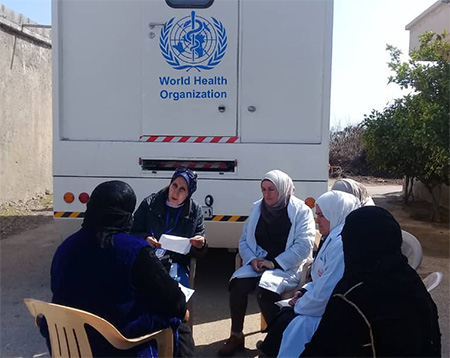 27 March 2022 - 25-year-old Muhdia from Karm Myasser district in Aleppo, Syria, was diagnosed with tuberculosis (TB) after being examined by the TB mobile clinic. Muhdia was losing weight, coughed frequently, had fever and difficulties in breathing. Thanks to the agility of physicians, she was immediately referred to the TB centre in Aleppo where doctors started the treatment and explained the importance of taking medication for the next two years for the full recovery.
27 March 2022 - 25-year-old Muhdia from Karm Myasser district in Aleppo, Syria, was diagnosed with tuberculosis (TB) after being examined by the TB mobile clinic. Muhdia was losing weight, coughed frequently, had fever and difficulties in breathing. Thanks to the agility of physicians, she was immediately referred to the TB centre in Aleppo where doctors started the treatment and explained the importance of taking medication for the next two years for the full recovery.
After three months of intensive multiple drug-resistant treatment, Muhdia started recovering. She became pregnant and for the fear of harming an unborn baby, she initially refused to continue the treatment.
“I was panic-stricken at the thought of losing my baby,” said Muhdia.
TB professionals convinced her to maintain the treatment and observe any side effects. The centre also provided follow up services at Muhdia’s home. She has delivered a healthy child and has been continuing her treatment.
“Thanks to the treatment and supportive health professionals, I feel much better, and my baby is healthy. It helped me get through a time of great worry and uncertainty,” Muhdia said.
Since the Aleppo TB centre reopened in 2018, it has admitted many patients. The centre, which is the only health care facility in Aleppo governorate that specializes in treating TB, provides free diagnosis and treatment services to patients from four neighbouring governorates in northern Syria.
The daily operation of the centre and of the mobile clinics is supported by WHO through the contribution of the Global Fund to Fight AIDS, TB and Malaria, while the Government of Japan supported the rehabilitation. TB services, including diagnosis, treatment and awareness sessions, are provided to internally displaced people and other vulnerable populations in emergency response areas, as well as penitentiary facilities since March 2020. Since then, more than 78 606 people throughout the country have benefited from the services of mobile clinics, and 180 TB cases have been diagnosed in Aleppo alone.
In 2021, over 685 people with TB in Aleppo were diagnosed and offered treatment. WHO also helps provide financial aid and food baskets to support TB patients and their families during their treatment journey.
“WHO is committed to facilitate active case-finding to identify people with the disease and give them the help they need,” said Dr Akjemal Magtymova, Head of Mission and WHO Representative in the Syrian Arab Republic. “As low as the TB prevalence in Syria might be, the pre-conditions for contracting TB are quite high. Undernutrition, poverty, HIV, diabetes and tobacco are among the key drivers of the TB epidemic. I believe that with joint efforts elimination of TB is possible,” Dr Akjemal Magtymova added.


